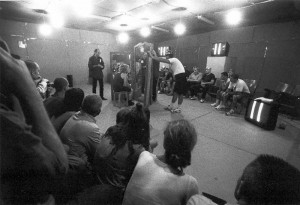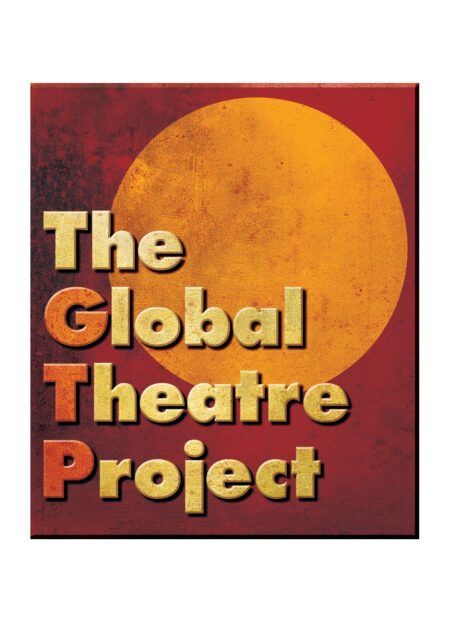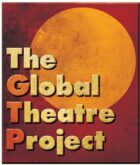Theatre’s Outlying Elements
The more I think about theatre, the more I find myself asking what theatre truly is. I am more and more sure we will only know this when we understand the scope of what theatre, truly, can do.
Essentially, theatre must tell a story and that story, using as many senses of the human imagination as possible, must carry an audience into its depths and heights while, at the same time, reminding them that those depths and heights are within themselves as well.
 So, with this in mind I ask: what is theatre? Today, in 2011, what is the purpose of creating this type of work? When I look at what most excites me about the projects we did in Florence and the work we strive to create under The GTP umbrella I realize that ‘theatre’ is both the final product AND the outlying elements which surround its development. Equal in significance is the individual experiences that are formed in its creation as well as the stories and catharses, that are fashioned as a result of beginning the journey of artistic inquiry. Theatre is so potent that, as mentioned in my previous post, it can be considered highly dangerous to political and social powers. But it can also be a curative for what aches within us: expression of our own story-telling natures. Whether that is the narrative of our life or the narrative of our emotional pain or joy we, all of us, must tell our stories. Nowhere is this more apparent then in the use of theatre in prison rehabilitation.
So, with this in mind I ask: what is theatre? Today, in 2011, what is the purpose of creating this type of work? When I look at what most excites me about the projects we did in Florence and the work we strive to create under The GTP umbrella I realize that ‘theatre’ is both the final product AND the outlying elements which surround its development. Equal in significance is the individual experiences that are formed in its creation as well as the stories and catharses, that are fashioned as a result of beginning the journey of artistic inquiry. Theatre is so potent that, as mentioned in my previous post, it can be considered highly dangerous to political and social powers. But it can also be a curative for what aches within us: expression of our own story-telling natures. Whether that is the narrative of our life or the narrative of our emotional pain or joy we, all of us, must tell our stories. Nowhere is this more apparent then in the use of theatre in prison rehabilitation.
In his story on NPR Bringing The Bard Behind Bars In South Africa, Anders Kelto reports on a program which uses theatre at The Bonnytoun House in Capetown as an effective outreach program. Dennis Baker, the manager of that facility for 25 years says about the staff who work with these boys “You can almost see the light go on when they see that same boy, in a totally different light, with a tunic on, pretending to be some kind of warrior, you know? And they say, maybe this boy can change.” What I believe is that not only can that boy change, but those around him as well. The ‘outlying elements’ I mentioned above includes the correctional system which allows for the possibility that by including theatre there can be a shift in predictable outcomes. Those boys experience themselves as individual expressions. And, as a result, are now seen as what they really are: individuals. They are seen as individuals by individuals throughout the process and presentation of this story telling. This, I believe, is a central aspect of what is theatre.
My colleague, Dominique Cieri, lead Teaching Artist and Playwright Fellow of New Jersey has developed many vital programs in this field. Particularly what comes to mind is her work with the boys at Greene Correctional Facility in New Jersey. She has worked with very violent, and ‘dangerous’ kids. And it has not been a cakewalk for her each year as she entered the room with a new group of defensive, angry boys. But weeks later she enters a room of ‘actors’ and ‘writers’ who not only are working together but are playing together. Does she change the world? If she guides one kid out of 30 to understand their full value then, yes, she does.
How does all this relate to The Global Theatre Project?
As I listened to the story on NPR I realized that it would be wrong of me to not take into account that there are thousands of American youth in jails and correctional facilities here in the states that are working with professional theatre artists such as Dominique. Why not put them in collaboration with artists like The Independent Theatre Movement South Africa or Armando Punzo’s Teatrale nel Carcere di Volterra in Italy, and others abroad who are doing the same work with thousands of incarcerated individuals?
If we delve deeper into this aspect, with all the power of our professional lives, artistry, experiences and knowledge and create an international collaborative inquiry…. I wonder what type of theatre would result from exploring these ‘outlying elements’. I wonder what kind of international relations would be developed. And I hope, someday, to create a project that allows us to find out.


